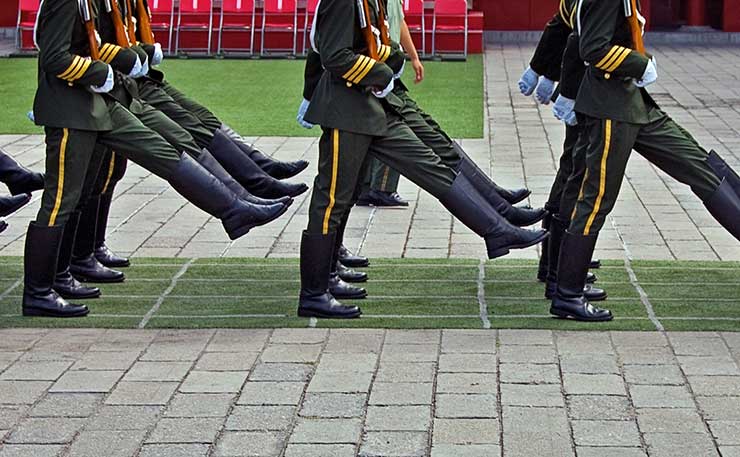Theologian-philosopher Dr Mark Manolopoulos explains why he endorses China’s strict regulation of religion, and how other countries may also learn from such apparently “extreme” action.
A few weeks ago, I was watching ABC News and I happened to come across a report filed by China correspondent Matthew Carney about China’s purported suppression of various Christian communities.
The report, titled “Going underground: the Communist Party crackdown on religion in China”, stated that the Chinese Government is introducing tough new laws that purportedly further restrict religious organisations, targeting Christian congregations, which often take the form of “house churches”.
Carney’s language was quite emotive, and the report featured dramatic film of churches’ crosses being either toppled off their steeples or burned off. Dramatic, indeed.
The news item happened to share/relay the same kind of information and sensationalist tone found in a CBS article from more than half a year earlier (March 2016): it, too, featured burning and falling crosses – and, yes, the use of the word “crackdown.”
Granted, the reports weren’t supposed to be comprehensive accounts (though the ABC report ran for quite a few minutes), but they were nonetheless pretty thin on detail as to why the “crackdown” was occurring in the first place.
However, the aim of this article isn’t to determine the degree to which the ABC or CBS reports may be accurate, nor am I interested in discussing here how these kinds of stories exemplify anti-China bias by western mainstream media.
Obtaining the nitty-gritty details about the Chinese crackdown isn’t really germane to my basic point: all we need to accept here is the contention that the Chinese are indeed taking quite a “tough” stance on religion.
Now, you’d think that I, as a “Christian” (the scare quotes signal all sorts of qualifications), would be horrified/outraged/saddened/disappointed by these news reports. But I wasn’t. In fact, I was edified by it.
Why? Why should such a stance be endorsed? – including/especially by the theologically-inclined?
First of all, I can’t stress enough that the Chinese Government doesn’t completely oppose or ban religions. The “crackdown” is not an absolute ban on any and all religious activity. Religious freedom is exercised in communist China. Chinese society is undoubtedly religiously pluralistic. All sorts of faiths and spiritualities are allowed to flourish. So the official Chinese stance is not anti-religious per se. And at least the CBS report had the decency to emphasize that the officially atheist Chinese government nevertheless permits religious freedom.
But this doesn’t mean that China should be hyper-permissively multi-faith either, allowing each religious community to do as it pleases, without any restrictions, in the name of religious freedom.
I contend that social harmony can only truly exist in a religiously plural society when all of its citizens accept – or are forced to accept – certain rational-ethical universal principles and practices that not all faith communities have traditionally accepted and often continue to resist, including the various equalities (gender, ethnic, sexual, marriage, etc.).
In other words, the State should underwrite and enforce the inalienable, universal rights and freedoms that will often clash with religious dogmas and practices (“often” – not “always”: a number of religious ideals and actions are consistent with Reason, e.g., the Golden Rule).
Whenever the two conflict, the rational-ethical principles and practices should overrule religious teachings and traditions. Why? Because a pluralistic society (even one that is only denominationally diverse) can only truly cohesively function if it’s governed in a secular way, where no one faith – or non-faith – is privileged.
So I’m not arguing for a militantly atheistic society (exemplified by some totalitarian communist regimes) but for a radically secular one, where neither theism nor atheism hold sway, but where Reason rules.
When religious ideologies or practices contravene the dictates of Reason, when their freedoms impinge on rational freedoms, or when they unreasonably threaten the solidarity of a fairly rational State, then the State should be allowed to restrict or ban religious teachings and/or practices. Whenever religions begin to over-step their jurisdiction, whenever they appear to exhibit some kind of rationally unjustifiable resistance towards the State, then the government has the right to impose restrictions or bans.
Hence, instead of swallowing western media propaganda against atheistic-communistic China’s “crackdown” on (western) Christianity, let’s not only question the media’s representation but in fact go further and endorse what the Chinese Government is doing.
Of course, China should ideally be officially “secular” not “atheistic”, thereby reinforcing the notion that the governance of society shouldn’t involve biasing one faith (or unfaith) position over others. If it wants a harmonious society, then the State should only “bias” Reason.
And so, as “paradoxical” as it may appear, a multi-faith society can only truly function cohesively within a thoroughly secular framework. Many modern conflicts are glaring examples of what happens when this framework is dismantled.
Donate To New Matilda
New Matilda is a small, independent media outlet. We survive through reader contributions, and never losing a lawsuit. If you got something from this article, giving something back helps us to continue speaking truth to power. Every little bit counts.





